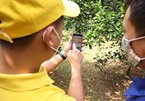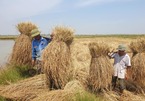 |
|
|
During summer, at Le Thi Dung's farm in Khanh Cu commune (Yen Khanh, Ninh Binh), workers, instead of taking care of vegetables under the sun, can sit in an air-conditioned room to perform tasks through smartphones.
Dung said that over a decade ago she began to accumulate land for large-scale agriculture. However, her farm still operated in a traditional way, with the main tasks performed manually. As a result, productivity was low and product quality was not high.
Dung soon realized the role of technology in agricultural production, and decided to apply IoT (Internet of Things) technology to her farm.
Accordingly, the data collected by the sensors from the entire garden is sent to a centralized processor. The system can analyze and issue control commands on the spot without waiting for the server system.
Dung’s workers can stay at the control cabinets as well as on the mobile phone app. Dung can monitor all production activities and make necessary decisions anytime and anywhere.
All processes including composting, watering and plant care are recorded by a computer and managed on the phone.
In the past two years, farmer Nguyen Van Phuc, a member of Suoi Thong Cooperative in Don Duong district, Lam Dong province, has no longer had to water or fertilize plants manually.
Holding a smartphone in his hand, Phuc said that daily plant care data is updated and transferred to the control center. If there are problems, the system will send an alert and engineers will make an adjustment.
Nguyen Dong Hai, the owner of a vegetable farm in Da Lat, told VietNamNet that at his farm, plants are controlled for pathogens from the beginning because when sowing seeds, chips to control humidity and nutrients to monitor plant health are installed. Whenever the plant needs water or nutrients, the chips will issue an alert and the plants will be supplied with nutrients through an automatic irrigation system without human intervention.
High income
 |
With digital technology, Hai said data is updated to a QR Code quality control system so that when his products are supplied to the market it is possible to trace their origin easily. The market for Hai’s agricultural products has expanded as they are eligible to enter major retail supermarkets across the country and also for export to choosy markets such as Europe and the US. Hai said he earns VND60 billion (nearly $3 million) in revenue from the farm.
At Le Thi Dung's farm, tomatoes and vegetables are all purchased by organic food providers and vegetable exporters. In the past two years, revenue from her farm has reached VND19 billion ever year thanks to technology.
“The number of workers has been cut from 20 to 10, and the quality of products is absolutely safe," said Dung.
In Lam Dong province, the use of information technology and automation in the agricultural sector has contributed to improving production efficiency, product value and labor productivity. The average production value is about VND400 million ($18,000) per hectare; and organic vegetable production model over VND500 million ($25,000) per hectare per year, including VND8-9 billion ($400,000) for hydroponic vegetables.
At Anh Dao Cooperative in Da Lat City, thanks to greenhouse and net house technology and automation irrigation equipment, fruit and vegetable productivity has increased sharply, yielding revenue of more than $10 million per year.
Tam An

9 million farming households and a digital ‘revolution’ on 7 million fields
Vietnamese farmers need to conduct a ‘revolution’ by going digital and creating a data store to do business.

Vietnam’s agriculture: from local to global mindset
Agriculture has always been a pioneer in the Doi Moi (renovation) process, contributing significantly to achievements in poverty reduction and food security in Vietnam.